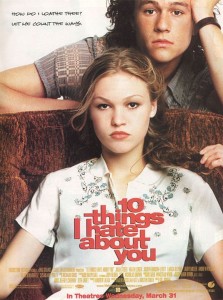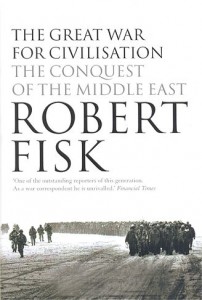
When I switch on the radio or pick up the paper to read about Junior Cycle changes, one thing I hear a lot is that we’ve pretty much got consensus on the need for change.
How exactly that change should be implemented is still being debated but the why is supposedly clear to us all. Except I’m not sure that it is!
Why would we change the way we teach and assess Junior Cycle English? Is it really so flawed?
To me, the answer is yes. While there’s a lot that’s commendable and worth retaining, there’s definitely room for improvement.
So with tongue firmly in cheek, dear Junior Cert English exam, here are 10 things I hate about you.
1. You’re a time trial.
You’re all about who can race through the most stuff in the shortest amount of time possible, firing out answers, making sure to make three points in every answer and whatever you do, don’t bother trying to offer any depth because there simply isn’t time!
Unseen drama? 20 minutes.
Unseen poetry? 20 minutes.
Unseen fiction? 20 minutes.
I like to take it slow and take it in. I read once to enjoy, twice to understand, three times to analyse, a fourth to respond.
You like speed dating.
I do not
2. You repeat yourself – a lot!
You keep asking me to demonstrate the same skills – critical thinking, emotional intelligence, level of literacy, ability to speed think and read and write (see above!)
The material I’m reading is different every time but the questions?
Well, they basically all do the same thing: they test how well I understand and can interpret what I’m reading. Which is a really important thing to examine.
But do we have to do it FIVE TIMES?
Yes, I know a poem and an ad and a descriptive passage are different genres. And non-fiction’s not the same as fiction. And drama is different again. But can’t you just take it from me that I’ve gained comprehension skills IN ALL OF THESE GENRES so if you select one at random, you’ll probably get a good sense of where I’m at with the whole reading – comprehending – responding thing?
Perhaps give me a bit more time (see above!) and let me flex my comprehending muscles a little more? Instead of repeating yourself over and over again so that I have to repeat myself over and over again until we’re both broken and weary and fed up.
3. You warp the learning!
This one may seem a bit harsh and I’m not trying to upset you here. I know lots of learning has happened because of you and for that I am grateful.
But I’ve had students APOLOGISE to me for writing four pages of utterly brilliant critical analysis of Shakespeare because “I know it’s stupid to write this much when there’s no way I’ll get this much written in the exam”.
I’ve had students anxiously present me with their very best work with slumped shoulders because “It’s not three pages long Miss” and I want to rip my tongue from my throat for ever mentioning that you’d be expected to write three pages for honours English. Because a students’ best should always be good enough even if it’s not good enough to climb the greasy pole of the bell curve and get a C.
I’ve had a student linger after class and mutter, whilst looking at the floor “I know you’re getting cross with me for not handing up my written work so I made this”
And she fumbles a memory stick onto my desk from where it’s hidden up her sleeve and hurries out the door. It’s a poem set to music with images and text combined; text she wrote herself; and it’s beautifully written. She is a storyteller but her medium is not the short story. Not this week…
So I ask her the next day, as I ask them all when I encourage them not to let themselves be defined by an exam which cannot measure their worth: Have you learnt from doing what you just did? Well that’s good enough for me!
4. You’re a sheep in wolves clothing
You strut about looking so tough that all the people in the land are supposed to be afraid of you. Some people even believe your hype; that you really really matter; that when you’re coming to visit we should spend months – or even years – preparing for your arrival.
But the thing is, you don’t matter THAT much. You’re a nice guy and you give us good feedback on where we’re at. You act as a motivator (for some) and your heart is in the right place. Go you!
Except…
Except we’ve been pretending you’re something you’re not.
And as soon as you’re gone, we turn around to the people who believed in you and spent months, or in some cases years, preparing for your arrival and we say:
“Yeah, we lied. That didn’t really matter. Forget he was ever here. Actually we’ve got a much more important visitor who’ll be here in two years’ time; that’s what you really need to focus your energies on!”
5. You don’t value all the things that should be valued!
Let me preface this by saying we’ve got a lot in common you and I.
We value fairness and transparency; we value great literature and critical thinking.
We want to expand the scope of what gets studied, not limit it, hence I love it when new questions appear about guerrilla advertising and the watershed and autobiography – but always with enough info for the students to figure it out even if they haven’t studied this specific genre before.
[It’s just a shame they don’t have a bit more time for thinking, because new ideas always need thinking space to breathe]
So, yeah, we value a lot of the same things.
But I also value the writing my students do outside of the exam hall.
And you don’t.
There are some vital things you just cannot offer students. Time to think and time to plan; time to research and refine; time to write and time to re-write (just as I have written and re-written this blog post after thinking about it for quite some time).
In class and outside of it I’ve seen students take the time to create something incredible. To write and re-write until their piece does what they want it to do; says what they want it to say; evokes the emotions, tugs on the heartstrings; touches the heart.
But if the system only values what happens in an exam hall, then the system itself promotes a lie. It promotes the lie that you can either write well or you can’t, when in reality, learning is incremental and as Hemmingway once said “the first draft of anything is shit”.
I know you know this. That’s why you’re willing to change.
But before I let you off the hook, there’s something else you need to value.
Public speaking skills.
I want my students to deliver speeches, not just read them and write them.
I want them to conduct real interviews not just imagine them in their heads and write them down. I want them to read poetry aloud not just dissect it. And I want them to find their own voice, however hard that might be in the storm of adolescence, and to trust that their voice matters and deserves to be heard (though not always agreed with!).

At this point I need to offer an advance apology. We’ve got history, you and I, dear Junior Cert exam, so while my first five reasons for taking issue with you might (!) be considered fairly reasonable, reasons six, seven and eight are entirely personal and in some cases, a bit silly!
Forgive my indulgence. Skip if you please…
6. You can’t predict the future…
You’re in many ways like the Witches in Macbeth – you both make people doubt themselves and inspire in them a dangerous confidence.
I’ve had very talented writers get a C in Junior Cert English for all sorts of reasons. Because they like time to think as they write. Because they want to offer depth not surface. Because they know the wolf is really a sheep!
Yet they can go on and get an A in the Leaving Cert.
Why is that? Where’s the disconnect?
I’ve also had students with outstanding exam technique (timing plus PQE can get you a long way at this level!) get an A in the Junior Cert and then wonder why they struggle so much when they transition to Senior Cycle English, with all the depth, complexity and long-term stamina that it requires.
Why is that? Where’s the disconnect?
Of course I do admit, dear JC, that for many students, you do seem to offer a fairly reliable indicator of future success in the Leaving Cert. So my wild generalisation based on anecdotal evidence that you don’t accurately predict the future is completely unfair and I apologise.
And I know I could just wriggle out of this one by quoting Walt Whitman
“Do I contradict myself? Very well then, I contradict myself, I am large, I contain multitudes”
But this would be disingenuous so instead I’ll say this. I’d love to see some research into how well grades in Junior Cert English map onto grades in Leaving Cert English…
[- starts searching to see if this research exists…
7. You never really loved me.
I got a B in Junior Cert English. Back in 1994. 20 years on I still haven’t forgotten the disappointment.
My three older siblings all did very well in the JC. I did not (by O’Connor standards!)
It was partially their fault! They kept telling me you were just a sheep dressed up as a wolf. And wait ‘til I got to Leaving Cert – that was the really hard bit! And college exams? Man oh man! I was in for it! But the Junior Cert? Piece of p*ss.
So I didn’t do much study and cruised along, doing my homework (mostly) but not much else. Except for English and History. Those I loved. Those I worked at. I read The Merchant of Venice multiple times. I learnt off poems like “I see his blood upon the rose” and “Original Sin on the Sussex Coast”. We had a copy where we’d handwritten each of our studied poems, 15 or 16 of them. Even now I can recite most of them by heart. I still have that copy.
But I liked to pause and think before writing. And I wrote slowly.
This you did not like! You and your speed dating!
Thankfully Leaving Cert English was more like being in a serious long term relationship; now that was something I could commit to! I still wrote slowly so it became all about quality over quantity but at least there was less reading on the exam paper.
It seems strange to me even now that I care so much what grade I got from a silly dressed up sheep; but I was young and it was the first time an outsider had judged my writing and found it wanting. That’s why it stung.
8. You get me in trouble…
I tend to speak my mind. I tend to tell people that I think you’re very flawed.
(I hope you don’t mind, I never meant to hurt your feelings).
But because we have a cultural obsession with pretending that you’re really very important, some people don’t like hearing that. In fact I’ve been scolded – by parents and occasionally even students – for not buying into the myth of your supreme perfection.
9. You distract from our real purpose.
We get so caught up in your hype that we sometimes forget the obvious: students don’t study English so they can sit an exam.
Some might think that’s why they study it but we know better!
We study English because of how it makes us feel. We study English to appreciate the creativity of others and to develop that creativity in ourselves. We study English to hone our critical thinking skills and to develop the art of rhetoric.
We study great literature to see and understand our own and other cultures and because it represents the very best of what has been thought and written through the centuries.
We study media so we can understand and negotiate the often hidden messages that bombard us every day.
We study English so we can become better communicators; so we can learn to express and defend our own ideas, our own opinions.
We study English so we can contribute to society culturally, socially and politically.
Some say knowledge is power, but it is through language that we gain knowledge and so I say language is power.
Ultimately we study English because it is worth studying.
10. You’re not fit for purpose
Not quite.
But you’re not beyond redemption!
You’ve got a lot going for you. Unlike some subjects, you don’t particularly lead to rote learning as 75% of you is unseen prior to the exam.
I’d like you a lot more, however, if you were less of a time trial. If you stopped repeating yourself. If quality mattered to you more than quantity. If we expanded your remit to embrace film/multimodal/digital texts; writing as a process; and speaking and listening skills, things that cannot easily be assessed in a pen and paper written exam.
—
Wiser heads than I have designed a new English specification that aspires to do all of the above.
Of course, as ye olde cliché says ‘the devil is in the detail’, so it’s not surprising that how exactly these changes should be implemented is still being debated.
But having – more or less – achieved consensus on the need for change is surely a good starting point for us all!












